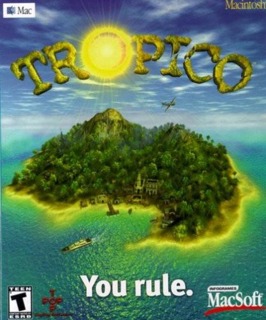Caribbean Cold-War nostalgia with a serious political heart. An innovative, but sadly not yet revolutionary, classic.
This is more or less in whose shoes Tropico puts you in- a newly elected (or militarily installed) autocratic ruler of a struggling island nation. Your people are poor, have no food and education, and scrape a living in shacks and farms. You are their saviour, a man or woman with a dream of change and prosperity for all. Will you follow the American model, and create a free-market haven for foreign tourists? Or a Soviet styled collective, where everyone in the factories is an equal? Either way, it's funny how even the best intentions can lead to unexpected ruin, and a degeneration into despotism as you struggle to keep power. A few more years, you tell yourself, a few more years and the economy will recover, the new generation of doctors and teachers will stand up, and my people will love me again. Until then, I'll just have to rig the vote. And imprison the opposition. And buy more guns.
Of course, you can just start out a total lunatic. Tropico provides plenty of fun paths to dystopia from the get-go. Use police to supress the freedom of your subjects. Send them to work in mines and factories for long hours with low pay. Teach your children that might is right, draft them into the army, and send them into the jungles to crush the rebels who make your life a misery. Siphon funds into your offshore bank account and make sure at least that, when the rebels finally run amok, kill your last bodyguard and break into the palace, you are well away on the boat to Las Vegas to cash in your chips.
This is not to say that it's impossible to achieve any good in Tropico. With some perserverent and perceptive policies, it's possible to build a balanced society that doesn't entirely disenfranchise one group or another. It's just very difficult. Luckily, the game offers several levels of difficulty, both economic and political, that can make things less of a challenge.
But this rather misses the point. Played on the easiest settings, Tropico is a fairly basic strategy game- build tenements for housing, farms for food, mines for income and so on. It's the extra elements that add so much more. Trying to survive in office through that tricky period after you've just built your first power station- a genuinely progressive move to further your people's prosperity, but one that empties the coffers- is most fun with a bit of political and economic instability factored in.
Aside from political modelling, there's a lot to recommend Tropico. It looks dated by today's standards, but is still attractively presented, and boasts an excellent Latin-jazz soundtrack. Zooming in to see a subject go about his daily life, wandering between the shops and avenues that you built yourself, is always a pleasure. Even more so with the interface telling you what his name is, where he's from, where he works and, of course, whether he's going to vote for El Presidente. All the easier to decide whether or not to throw him in jail.
The sheer political difficulty of the game forces you to need to do this, though, so it's not just a fun feature. You have to know what your populace is like, how many fall into which faction or demographic, how many are skilled or unskilled, in order to govern effectively. Gathering intelligence on the population is just another way in which Tropico makes you wonder about what sort of a ruler you'd make if given the chance.
This aside, Tropico manages to pull off such shenanigans with a healthy dose of humour and no little fondness for the Cold War despotisms of Latin America's past (and present), saving the game from being too serious. The overall tone is one of intelligent parody, not total farce. It's fun being a dictator, (especially one with the transparent flattery and compulsive gambler traits) but it doesn't throw it away. It's pretty spot-on actually, making it addictive to come back to.
To conclude, it's difficult to sum up a game that is so much deeper than most. Perhaps above all, it's a shame that it hasn't had any significant developments in the seven years since shipping. Games get considerably better looking, more realistic, and more interactive every year, but how many of them get any deeper to the heart of what it is to play a game? Tropico engages on levels that other games don't even attempt, but it's not hard to think of ways that a sequel could improve on those again. Truthfully, because I like Tropico so much, hope springs eternal.

